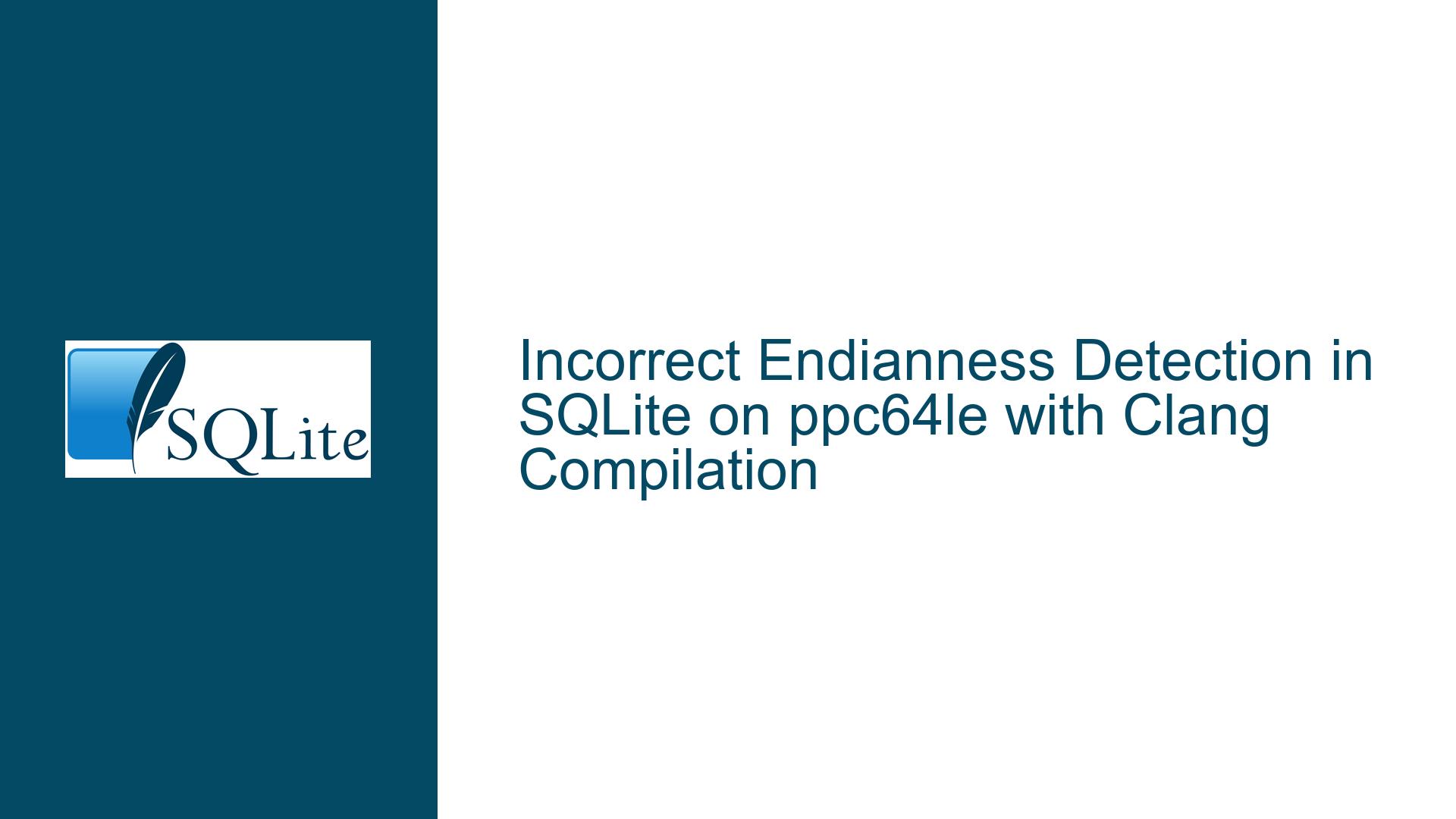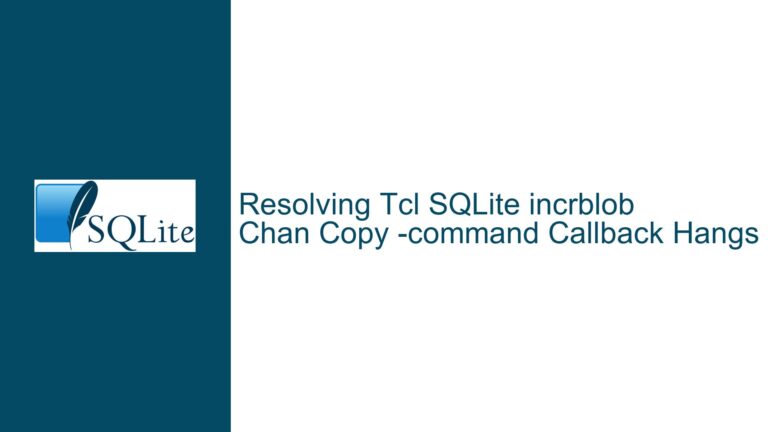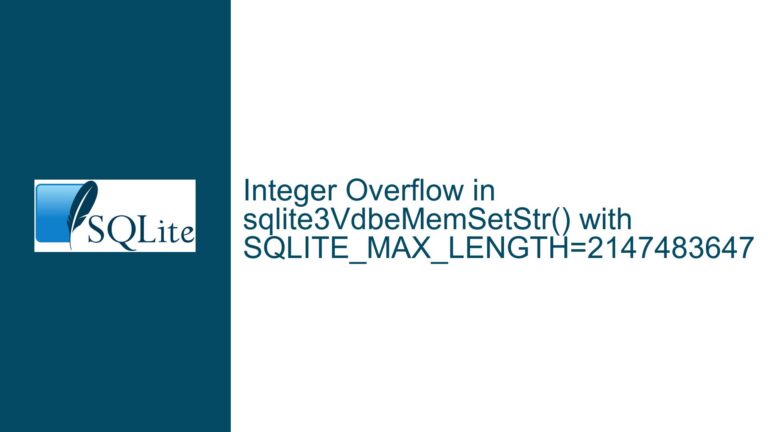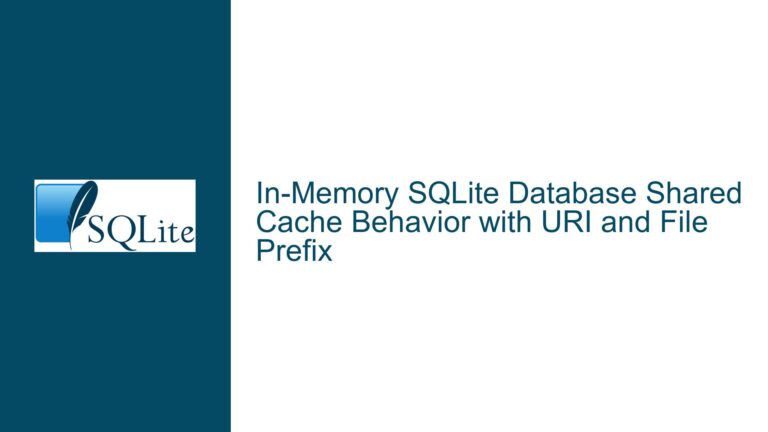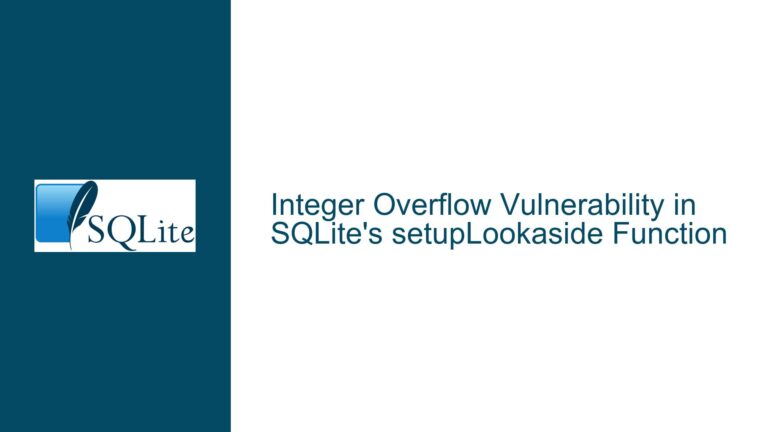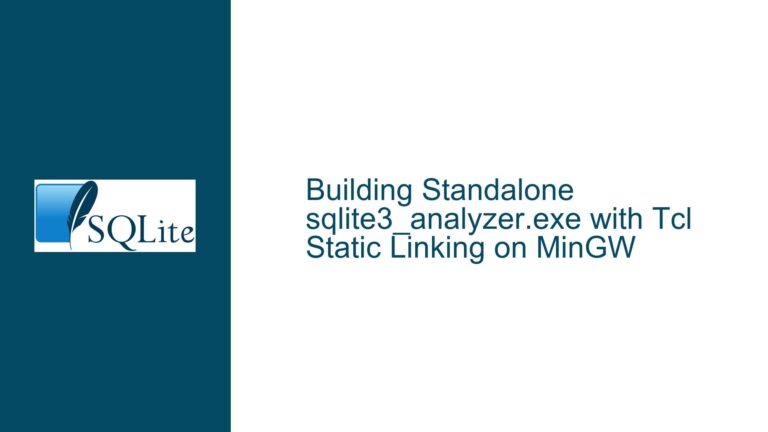Incorrect Endianness Detection in SQLite on ppc64le with Clang Compilation
Issue Overview: Endianness Detection Failure on ppc64le Systems
The core issue revolves around SQLite’s incorrect detection of endianness when compiled with the Clang compiler on ppc64le (PowerPC 64-bit Little-Endian) systems. This misdetection leads to corrupted SQLite databases, where all data is byte-swapped, rendering the databases unusable. The problem manifests specifically when SQLite is compiled with Clang, as opposed to GCC, which correctly detects the endianness at runtime.
The ppc64le architecture is inherently little-endian, but SQLite’s build process incorrectly assumes a big-endian architecture when the __ppc__ macro is defined. Clang defines __ppc__ on ppc64le systems, while GCC does not. This discrepancy causes SQLite to hard-code the byte ordering incorrectly, leading to malformed database files. The issue is particularly problematic because it affects not only SQLite itself but also applications that vendor SQLite, such as Firefox, which has encountered this issue in its vendored version of SQLite.
The symptoms of this issue include:
- Corrupted SQLite database files with byte-swapped data.
- Errors such as "database disk image is malformed" when attempting to create or modify tables.
- Inconsistent behavior between databases created with GCC-compiled SQLite and Clang-compiled SQLite.
The issue is not limited to a specific version of SQLite, as it has been confirmed to exist in versions up to SQLite 3.43.0. The problem is exacerbated by the fact that many Linux distributions, such as Chimera Linux and Alpine Linux, compile their packages with Clang, making this a widespread issue.
Possible Causes: Compiler-Specific Macro Definitions and Endianness Assumptions
The root cause of the issue lies in SQLite’s reliance on compiler-specific macros to determine the endianness of the system. Specifically, SQLite checks for the presence of the __ppc__ macro to determine whether the system is PowerPC-based. However, this macro is defined differently by Clang and GCC on ppc64le systems.
When SQLite is compiled with GCC, the __ppc__ macro is not defined, causing SQLite to fall back to runtime detection of endianness. This runtime detection correctly identifies the system as little-endian, and the database operations proceed as expected. However, when SQLite is compiled with Clang, the __ppc__ macro is defined, leading SQLite to assume a big-endian architecture. This assumption results in incorrect byte ordering, causing data corruption in the database files.
The issue is further complicated by the fact that the __ppc__ macro does not distinguish between ppc64 (big-endian) and ppc64le (little-endian) architectures. As a result, SQLite’s endianness detection logic is flawed on ppc64le systems when compiled with Clang. This flaw is not merely a theoretical concern; it has practical implications, as evidenced by the corrupted databases and the errors encountered when attempting to use these databases.
Additionally, the issue highlights a broader problem with SQLite’s build process: the reliance on compile-time macros for endianness detection. While compile-time detection can improve performance by avoiding runtime checks, it can also lead to issues when the macros are not defined consistently across different compilers and architectures. In this case, the inconsistency between Clang and GCC on ppc64le systems has led to a significant problem that affects the usability of SQLite databases.
Troubleshooting Steps, Solutions & Fixes: Addressing Endianness Detection in SQLite
To resolve the issue of incorrect endianness detection in SQLite on ppc64le systems, several steps can be taken. These steps range from immediate workarounds to long-term fixes that address the root cause of the problem.
1. Modify SQLite’s Endianness Detection Logic:
The most straightforward solution is to modify SQLite’s endianness detection logic to account for the differences between Clang and GCC on ppc64le systems. This can be achieved by adding additional checks for the __ppc64__ macro and the __LITTLE_ENDIAN__ or __BIG_ENDIAN__ macros. By doing so, SQLite can correctly identify the endianness of the system, regardless of whether it is compiled with Clang or GCC.
For example, the following code snippet could be added to SQLite’s build configuration:
#if defined(__ppc__) || defined(__ppc64__)
# if defined(__LITTLE_ENDIAN__)
# define SQLITE_BYTEORDER 1234
# else
# define SQLITE_BYTEORDER 4321
# endif
#endif
This code ensures that SQLite correctly identifies the endianness of ppc64le systems, even when compiled with Clang.
2. Remove the __ppc__ Check Entirely:
Another approach is to remove the __ppc__ check entirely and rely solely on runtime detection of endianness. While this approach may result in a slight performance penalty due to the additional runtime check, it eliminates the risk of incorrect endianness detection caused by compiler-specific macro definitions. This solution is particularly appealing because it avoids the need for compiler-specific workarounds and ensures consistent behavior across different compilers and architectures.
3. Apply Existing Patches:
For users who are unable to modify SQLite’s source code directly, applying existing patches that address this issue is a viable solution. As mentioned in the discussion, Chimera Linux and Alpine Linux have already developed patches to fix this issue in their respective distributions. These patches can be applied to SQLite’s source code before compilation, ensuring that the endianness detection logic is correct.
For example, the patch provided by Chimera Linux modifies SQLite’s endianness detection logic to correctly identify ppc64le systems when compiled with Clang. Applying this patch to SQLite’s source code before compilation can resolve the issue without requiring any additional changes to the build process.
4. Use GCC for Compilation:
As a temporary workaround, users can compile SQLite with GCC instead of Clang. Since GCC does not define the __ppc__ macro on ppc64le systems, SQLite will fall back to runtime detection of endianness, which correctly identifies the system as little-endian. While this workaround is not a long-term solution, it can be used to avoid the issue until a more permanent fix is implemented.
5. Update SQLite’s Build Documentation:
To prevent similar issues in the future, SQLite’s build documentation should be updated to include information about the differences between Clang and GCC on ppc64le systems. This documentation should provide guidance on how to correctly configure SQLite’s endianness detection logic when compiling with Clang, as well as any known issues and workarounds.
6. Collaborate with Compiler Developers:
Finally, it may be beneficial to collaborate with the developers of Clang and GCC to ensure that the __ppc__ and __ppc64__ macros are defined consistently across different architectures. By working together, the SQLite development team and the compiler developers can ensure that the endianness detection logic in SQLite is robust and reliable, regardless of the compiler used.
In conclusion, the issue of incorrect endianness detection in SQLite on ppc64le systems when compiled with Clang is a significant problem that can lead to corrupted databases and runtime errors. However, by modifying SQLite’s endianness detection logic, applying existing patches, or using GCC for compilation, users can resolve this issue and ensure that their databases remain intact and functional. Additionally, updating SQLite’s build documentation and collaborating with compiler developers can help prevent similar issues in the future, ensuring that SQLite remains a reliable and robust database solution for all users.
